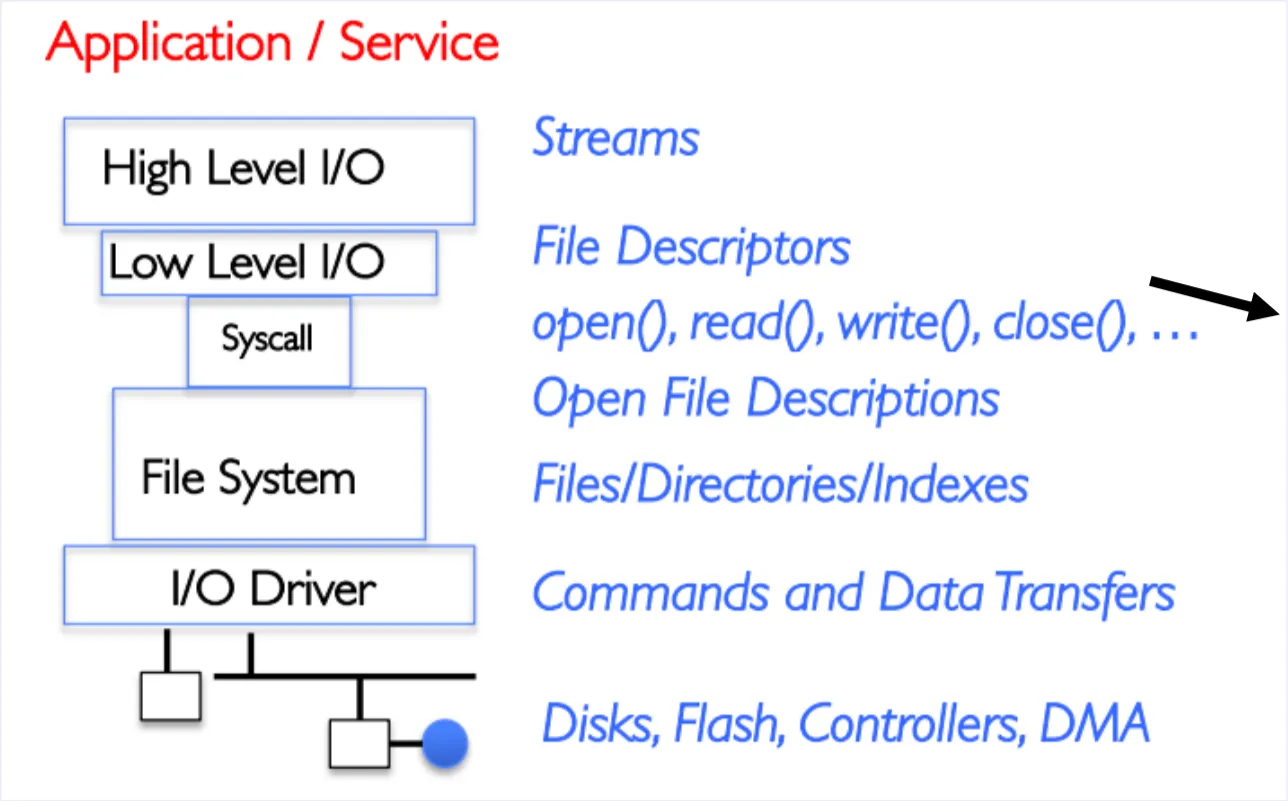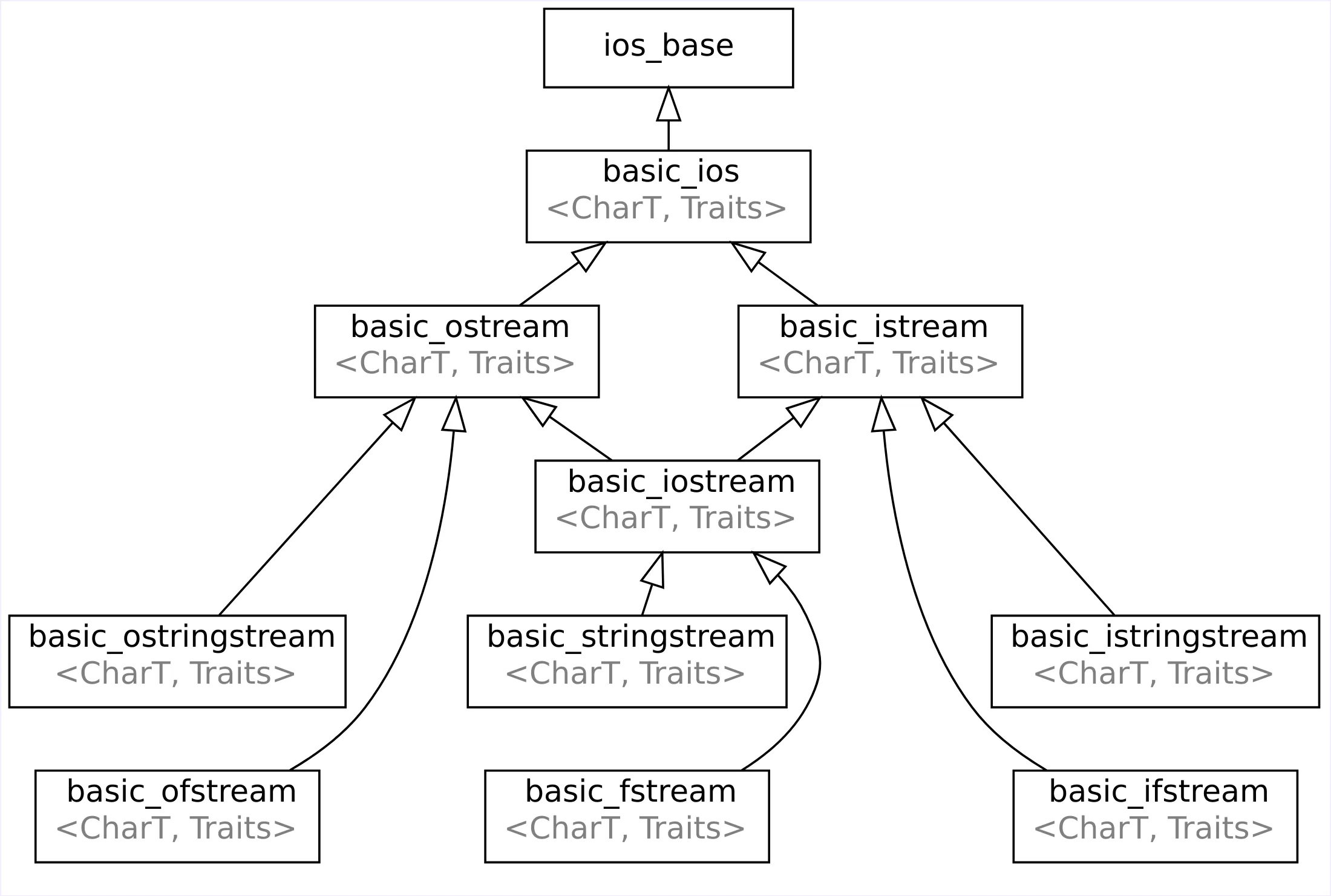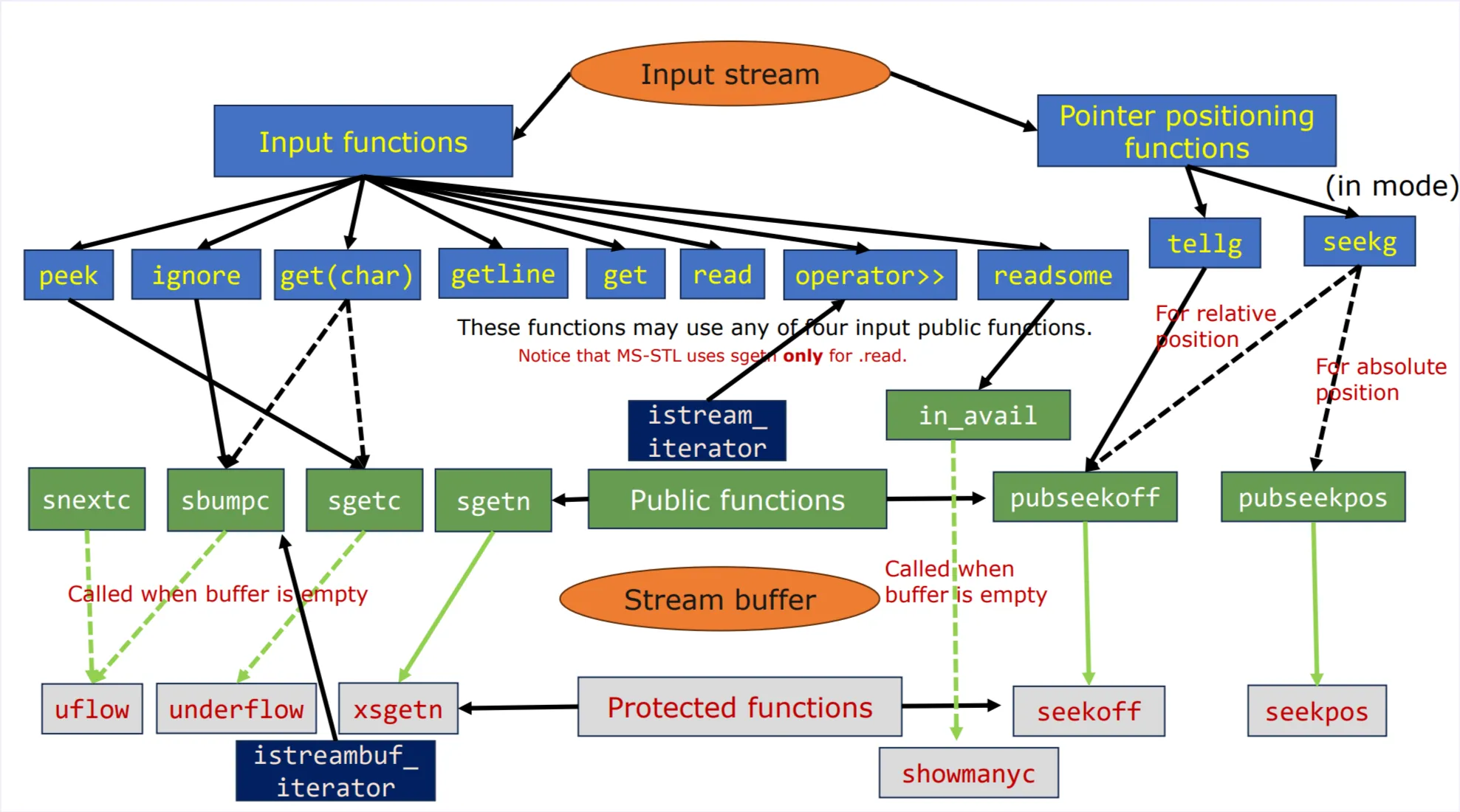

Modern C++ Basics - String and Stream
std::cout << "Debugging" << std::flush << std::tears;
views
| comments
String and string view#
std::string#
APIs#
.reserve()instd::stringcan be used to shrink memory before; but since C++20 it’s same asstd::vector..assign()/.insert()/.erase()/.append()also provides index-based version.- All index-based methods returns
std::string&instead of iterator.
- All index-based methods returns
+/+=/hash.starts_with()/.ends_with()/.contains().substr(): return a new string.replace()/.replace_with_range().data() -> char*/.c_str() -> const char*- Search:
.find()/.rfind()/.find_first(_not)_of()/.find_last(_not)_of()- Return index instead of iterator.
- Return
std::string::npos(i.e.static_cast<size_t>(-1)) if not found.
Notes#
- It is just an enhancement to
std::vector. std::stringguarantees the underlying string is null-terminated (i.e.'\0').- You can also have
'\0'in your string too, since it doesn’t judge end like C-style string, but by.size().
- You can also have
- It has SSO (small string optimization).
- Convert a string to/back from a number:
std::stoi/sto(u)l/sto(u)ll(string, std::size_t* end = nullptr, int base = 10)std::stof/stod/stold(string, std::size_t* end = nullptr)std::to_string(): same asstd::format(“{}”, val)since C++26
.resize_and_overwrite(newSize, Op)
std::string_view#
- It’s like a specialization of
std::span<const char>, i.e. it just has aconst char*with a length.
class Hasher {
public:
using is_transparent = void;
auto operator()(std::string_view sv) const {
return std::hash<std::string_view>()(sv);
}
};std::vector<std::string> vec { "PKU", "THU", "CMU" };
std::ranges::sort(vec, [](const std::string& s1, const std::string& s2) {
return std::string_view{ s1 }.substr(1) < std::string_view{ s2 }.substr(1);
});Caveats#
std::string_viewis not required to be null-terminated.- It may be not safe to use
.data()to pass into C-string APIs.
- It may be not safe to use
- The pointer it contains can be
nullptr(as default ctor does). - You should be really cautious if you want to use
std::string_viewas return value. - If you will create the string anyway (like in a ctor), pass a
std::string_viewis not a good idea.
Misc#
-
Character:
'a','\n',\0,\123,'\x12','\o{12}','\x{12}' -
Raw strings:
R"(\\\n\")"R"+(I want a )"!)+" -
using namespace std::literals"xxx"s->std::string"xxx"sv->std::string_view- Time-related:
1s,1ms,1d - Complex-related:
1i,i.5if,2.5id
-
User-defined literals:
operator"" _xx
constexpr unsigned int operator"" _KB(unsigned long long m) {
return static_cast<unsigned int>(m) * 1024;
}std::stoi()/std::to_string()will create newstd::string(costly); we may want to provide storage ourselves.- You can use
std::from_charsandstd::to_charsin<charconv>.
Print function and formatter#
Format#
std::format(){order : fill – align – sign - # - 0 – width - .precision – L – type}align:</^/>sign:+/-type:- Integer:
b/B/d/o/x/X- For
bool,sas default. - For
char/wchar_t,cas default and?.
- For
- Floating point:
e/f/g/a/E/F/G/A - String:
s/? - Pointer:
p/P
- Integer:
#:- Integer:
b/B/o/x/X->0b/0B/0/0x/0X - Floating point: dot will always be shown.
- For explicit
#g/#G, all zeros will be shown.
- For explicit
- Integer:
.precision:- Floating point: precision.
- String: the maximum characters to output.
0: Fill into 0 for only integers and floating points after sign and prefix.
widthandprecisioncan be determined in runtime:std::format("{:{}.{}e}", 3.14f, 3, 10);
std::format_to(OutIt, ...)/std::format_to_n(OutIt, n, ...)std::runtime_format()- For ranges:
n/m/nm- Also support
fill,align,widthspecifiers. - e.g.
{:*^50n::#x}forstd::vector<std::array<int, 2>> - For string elements,
{::}is different from{}.
- Also support
User-defined format#
enum class Color {
Red = 0xff0000,
Green = 0x00ff00,
Blue = 0x0000ff,
White = 0xffffff,
};
template<>
struct std::formatter<Color> {
char type = 's';
constexpr auto parse(const std::format_parse_context& context) {
auto it = context.begin();
if (it == context.end() or *it == '}') {
return it;
}
type = *(it++);
if (type != 'x' and type != 's') {
throw std::format_error{ "unrecognized color format." };
}
return it;
}
auto format(Color color, auto& context) const {
auto format_by_type = [it = context.out(), type = type](std::string_view string_info, std::string_view number_info) {
return type == 's' ? std::format_to(it, "{}", string_info) : std::format_to(it, "{}", number_info);
};
switch (color) {
using enum Color;
case Red:
return format_by_type("Red", "#ff0000");
case Green:
return format_by_type("Green", "#00ff00");
case Blue:
return format_by_type("Blue", "#0000ff");
case White:
return format_by_type("White", "#ffffff");
default:
auto it = context.out();
if (type == 's') {
it = std::format_to(it, "Unknown color: ");
}
return std::format_to(it, "#{:0>6x}", std::to_underlying(color));
}
}
};- Notice that we have a
White = 0xffffffso that it’s legal.- Range of scoped enumeration is the
(1 << (MSB(MaxEnum) + 1))- 1; otherwise UB.
- Range of scoped enumeration is the
- Use
auto&andconst auto&(supportstd::wstring) std::range_formatter<T>: to be inherited bystd::formatter<Container<T>>.set_brackets(left, right).set_separators(sep).underlying()
Stream#
Stream overview#

- System call is relatively expensive, so we prepare a buffer, and then just adjust pointer to buffer when reading.


Output stream#


-
The stream buffer can be got by
.rdbuf(), which returnsstd::basic_streambuf*.- It’s a base class that has a protected ctor, which uses polymorphism to access the actual buffer.
protectedvirtual methods can be overridden in derived class.
-
There are three bits for stream status:
std::ios_base::eofbitis commonly used to denote end of stream.std::ios_base::failbit: commonly used when parsing error, e.g. if youstd::cin >> some_floatbut input a character ‘a’; or failing to open/close file.std::ios_base::badbit: some irrecoverable error happens.- operators:
- get:
.rdstate() - test:
s & std::ios_base::eofbit/.good() -> bool/... - set:
.clear(states = goodbit) - add:
.setstate(states)or.clear(rdstate() | states) - throw:
.exceptions(states)
- get:
Input stream#


Bidirectional stream and stream linking#
- Bidirectional stream: Whether they share the same position is determined by the derived class.
- Stream linking: When the istream reads something, ostream will call flush() automatically.
- By
.tie(basic_ostream*).
- By
Standard streams#
File stream#
- Open mode:
in/out/trunc/noreplace/ate/app/binary- If you use
in | out(default), truncation will not happen automatically. - Use
noreplaceif you want to fail rather than create a new file. atewill only seek to end once, whileappwill always append at the end (even.seekg()doesn’t affect it).
- If you use
String stream#
- You can use
.str()to copy it out, or replace with a new string by.str(newStr). - Use
.view()to get thestd::string_viewto it.- But notice that future reallocation may make the view invalid!
Span stream#
- Changes are applied on the buffer directly, without worrying about whether the output exceeds the buffer (just truncates it rather than reallocate).
badbitwill be set in this case.- You need to ensure that the lifetime of buffer ≥ scope for span stream to operate on it.
- Get view:
.span(), getspan<CharT>- Notice: if the mode contains out, then it returns
[pbase, pptr), i.e. the part that’s already written. Otherwise the whole buffer.
- Notice: if the mode contains out, then it returns
Synchronized stream#
- Each thread has its own
std::osyncstream. - when you use
std::flush_emitexplicitly, the buffer is output to the attached stream without data race. - If you want / don’t want to emit every
std::flush, you can use<< std::emit_on_flush/std::noemit_on_flush.